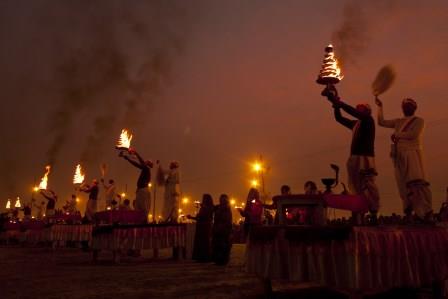
THE distortions of Dharma that we now-a-days see all around us are largely the result of foreign education. The English word ‘religion’ has substantially contributed in distorting the pure meaning of Dharma. The British first heard the word when they came to India. They had no word of an equally comprehensive meaning. Dharma is that which is good for everyone irrespective of the system of worship and can open up for him the way to salvation.”
– Pt Deendayal Upadhyaya, Pt Deendayal Upadhyaya: Ideology and Percepetion, Part – V (Concept of Rashtra), Edited by C P Bhishikar, Suruchi Prakashan, New Delhi
There is an outcry in Bharat over the humiliation inflicted on the wife and the mother of Kulbhushan Jadhav by Pakistan. Our armed forces are giving their everything to foil the infiltration bids from across the border. All efforts are being made to diplomatically isolate the terror-breeding Pakistan. But an anglicised and foreign educated leader of Congress still wants to continue with the fear-mongering technique by floating the idea of ‘Hindu Pakistan’.
Shashi Tharoor did so while responding to a remark by a Union Minister on the issue of ‘amending the Constitution’, regarding which he has already clarified and apologised. As far as fiddling with the core ethos of the Constitution is concerned, nothing can be more glaring than the imposition of Emergency and insertion of 42nd amendment to the Constitution by none other than the party that Tharoor represents. The founding-fathers of the Constitution had debated and discussed the words ‘socialism’ and ‘secularism’ and decided not include them in the Constitution. Still they were inserted in the Preamble in 1976 in an undemocratic way, when the entire opposition was in jail. So as a Congress representative, Tharoor has the least right to speak for the Constitution drafted by the stalwarts led by Dr Babasaheb Ambedkar.
Even if we give Shashi Tharoor a benefit of doubt and believe that he genuinely believed in restoring the sanctity of the Constitution, then he should have also spoken about harm done to the original spirit of the Constitution by his own party leadership. Instead, he chose to coin a new disastrous term ‘Hindu Pakistan’. Though the term is new, similar apprehensions were raised by many in the Communist-Liberal ecosystem. This is nothing but an extension of already fallen flat theory of ‘saffron terror’ which the UPA and Nehru-Gandhis tried to weave around not only within domestic politics but also flaunted it at the international level. The ongoing cases against Col Purohit and Sadhvi Pragya clearly exposed the conspiracy.
As saffron and terror cannot go hand in hand, same is true about the terms Hindu and Pakistan. Pakistan was created because some Muslim fundamentalists decided to part ways from the Hindusness of this country. The philosophy of Hindutva stands for those cultural essentials of our ‘Rashtra’ which even founding fathers of our Constitution also recognised. We respect and accept all ways of worship to be true not because we adopted ‘secularism’ as the basic structure of the Constitution but because of our Hindu ethos. The problem with fundamentalists and evangelists is that they do not adhere to the key ingredient and propagate one way to be true. There is no ‘ism’ in Hindu way of life and therefore Hinduness does not prescribe one text, one prophet and one way of worship as a dictum. The secularists and the ‘anglicised intellectuals’ do not recognise this fact.
Shashi Tharoors and Ramchandra Guhas are doing greater harm to Bharat by equating ‘Hindutva’ to Pakistan kind of theocratic State. They are giving fodder to the likes of Hafiz Saeed who harvest terrorism on Bharat as a ‘Hindu-State’. Stating the fact that Bharat is a Hindu-Rashtra is entirely different from making Bharat a Hindu-State. Theocracy is antithetical to Hinduness. So instead of stereotyping Bharat from the Western prism for petty political gains, these intellectuals should instead read the essentials of Dharma as differentiated from religion by Deendayal ji in his concept of ‘Sovereign Dharma’.
-Prafulla Ketkar
Courtesy: Organiser














